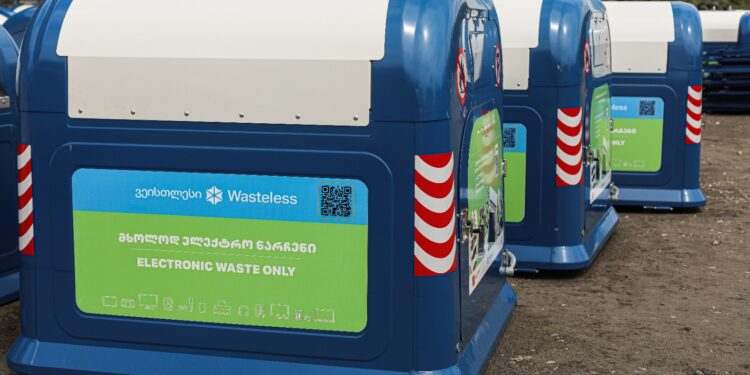Electronic waste, or e-waste, is one of the fastest-growing environmental and economic challenges of our time. According to the UN’s Global E-waste Monitor, more than 62 million tons of discarded devices were generated in 2022 alone, a figure expected to surge by a third, reaching 82 million tonnes by 2030. Less than a quarter of this valuable strategic resource is properly collected and recycled. As a result, only 1% of global demand for rare earth elements is met through e-waste recycling, while an estimated US$62 billion worth of recoverable resources simply go to waste each year. [Source: World Bank 2021]
Georgia faces similar pressures. The country generates from 900,000 to 1.1 million tons of waste annually. Its domestic material consumption (DMC) is close to the EU average, but the circularity rate remains just 1.48%, far below the EU’s 11.5%. Inadequate infrastructure, low public awareness, and limited investment in recycling technologies are key barriers holding back progress. [Source: Circularity Gap Report 2023]
Important reforms have laid the groundwork for change. The 2020 adoption of extended producer responsibility (EPR), the Waste Management Code, and commitments under the EU Association Agreement represent crucial steps towards a more circular economy. But e-waste management on the ground remains wholly insufficient. No official data exists on e-waste volumes or recycling rates, making it difficult to establish baselines and track progress. Municipalities lack formal collection systems, forcing residents to rely on unsafe, informal disposal methods that expose communities to toxic substances such as lead and mercury.
Meanwhile, weak enforcement of EPR means companies face little pressure to take responsibility for the products they put on the market. The result is a growing mountain of hazardous waste—one that communities are left to handle alone.
To understand why recycling policies weren’t translating into real action and how this gap was shaped by people’s attitudes and behaviours, UNDP, through our Accelerator Lab (AccLab), launched a behavioral experiment in the Zugdidi municipality.
The findings were striking. As we studied how residents handled e-waste, institutional gaps and economic barriers became clear, and one unexpected solution emerged: harnessing technology to rebuild trust and create a transparent, community-driven e-waste system.

Photo: UNDP/Atinati Radio
Understanding Bins and Behaviors
Our initial goal was simple: to test whether more collection bins and basic awareness could encourage safer e-waste disposal. Between June and October 2024, we reached out directly to the community, holding interviews and workshops with more than twenty stakeholders, including internally displaced persons (IDPs), women, youth, civil society representatives, electronics retailers, schools, academia, and local authorities. We listened to their experiences and mapped the factors shaping their decisions around e-waste. What emerged was a deeper challenge: not a lack of willingness to act, but a gap between intention and action.
People wanted to recycle but didn’t know where or how, and many doubted that collected waste would be handled properly. So, we reframed our question: how might we change behaviours and social norms, not just build infrastructure?
Together with the IDP Women’s Association ’Consent’, ‘Behavior Science For Social Impact’ (BISC Partners), and the producer responsibility organization Wasteless, we designed a set of behavioral experiments:
- In retail stores, we tested whether visible bins and positive social-norm messages could encourage more e-waste drop-offs.
- In the settlements of people displaced by conflict, we compared different messages – environmental, health-related, and community-driven – to see which resonated most.
- In schools, we explored whether learning sessions and student-led collection points could mobilize families and neighbors.
Over three weeks, 436 e-waste items – mostly small electronics such as phones, chargers, and batteries – were collected across eleven sites. The results were revealing:
- Environmental messages worked best.
- Awareness sessions helped, but one-off actions weren’t enough.
- Leadership mattered; community champions, like teachers, civil society representatives, and Zugdidi Central Library’s leadership, made a real difference.
Still, it was clear that behavioral nudges alone couldn’t fix an e-waste system, which continued to struggle with limited infrastructure, missing data, low public participation, and weak private sector engagement, hampered by minimal environmental commitment and few financial incentives.
Sustainable change would require stronger incentives, more transparency, and a management model that communities could truly trust.

Photo: UNDP/Irakli Dzneladze
From Behavior to Blockchain
That insight led us to our next big idea: could technology help build trust and offer incentives to make circular waste systems truly work at the local level?
In 2025, the Zugdidi experiment evolved into a blockchain-powered model through the SDG Blockchain Accelerator, UNDP’s global innovation platform that helps promising ideas grow through potential targeted funding, mentorship, and technical expertise. Zugdidi’s pilot was selected as one of the programme’s challenges, developed in partnership with Creative Operations (Kenya) and Wasteless (Georgia) to test how blockchain-powered tools can transform community-based e-waste management.
The concept is simple but powerful:
- Track every item of e-waste through a secure, transparent blockchain system.
- Reward users with digital ‘Eco-Tokens’ redeemable in local shops.
- Involve retailers through trade-in schemes and tokenized gift cards.
- Empower the community through a digital cooperative, a flexible platform where residents, businesses, and producer responsibility organizations (PROs) can pool resources, vote on decisions, and earn incentives while tackling local challenges transparently.
By combining behavioral insights with technology, we are testing a new model of community governance that can align incentives, build trust, and grow sustainably.
Looking Ahead
From June to October 2025, we built a blockchain platform demo and tested it across the Zugdidi municipality, engaging a focus group of up to 15 individual users and partners from the Zugdidi Central Library and a local retail store.
As this pilot initiative nears completion, we aim to take it to a new level – expand e-waste tokenization, onboard more retailers, and test a digital cooperative model in Zugdidi. If successful – with residents using the platform, retailers engaged, and blockchain ensuring transparency and incentives – the system could be replicated across Georgia and beyond, offering the scalable, transparent, community-based solutions to one of today’s toughest environmental challenges.
When in doubt, innovate! Because the boldest ideas often begin as experiments. Sometimes, the reward is not just in the outcome, but also in the courage to try.
Background Information
Established in 2019, UNDP’s Accelerator Labs serve as agile incubators for bold ideas that tackle some of the world’s toughest sustainable development challenges. Co-created with the Federal Ministry for Economic Cooperation and Development of Germany and the Qatar Fund for Development, the network connects 90 Labs worldwide, a global community of innovators, “the fast and the curious,” working together to turn local insights into transformative change.
In Georgia, the Accelerator Lab drives innovation across green transition, climate action, circular economy, and community resilience. Through its experimental mindset and pioneering spirit, the Lab helps UNDP discover, test, and scale new solutions, bringing our work ever closer to the realities and opportunities of the 21st century.
Source: https://www.undp.org/georgia
Author: Nita Gegeshidze Head of Exploration, Accelerator Lab, UNDP Georgia














